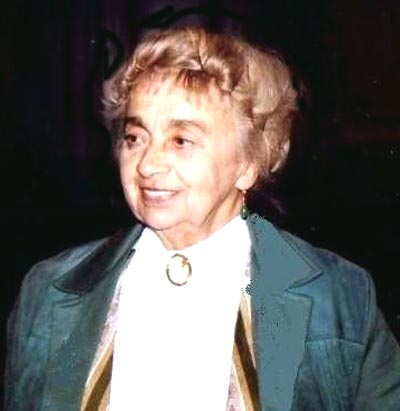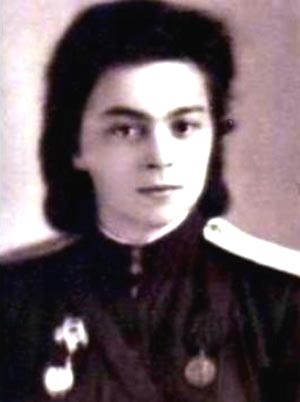Rashel Berezin was born in 1923 in Riga into a religious family. Her father Shneur-Zalman was a hazan (cantor), who simultaneously served as a supervisor at a yeshiva.
Rashel graduated from a private Hebrew-language Jewish gymnasium in Riga. She grew up in a Zionist atmosphere. The Berezin family was very musical. Cantorial music was often sung at home, in addition to Yiddish songs, as well as some secular tunes (e.g., with lyrics by Hayim Nahman Bialik). The musical atmosphere in her home influenced her choice of career: After completing high school, Rashel intended to enroll in the Latvian Music Academy.
In August 1939, after the signing of the Molotov-Ribbentrop Pact, Latvia found itself in the Soviet sphere of influence; in the summer of 1940, Riga became the capital of the Latvian Soviet Socialist Republic.
In June 1941, two days after the outbreak of the Soviet-German War, all the young people of Riga were summoned to a local airfield to assist the wounded. Rashel Berezin was among those who came. From there, they were taken to Velikiye Luki (Russia). Riga was occupied by the Germans on July 1, 1941, and Rashel's parents and sister were now under Nazi rule. Rashel would later learn that Latvian collaborators hanged her father, and that her mother and sister perished in the Riga Ghetto.
Rashel found herself in Ufa (in the Bashkirian Republic, Russia), after the Latvian representatives in Moscow had ordered all the evacuees from Latvia to be directed to that remote location. From Ufa, Rashel Berezina was sent to the local regional center, where she studied at a nursing school for three months. After that, she began to work at a hospital, although she wanted to be sent to the front lines. This desire was frustrated, with the draft board rejecting her (apparently, because of her age). Eventually, however, she reached the front with a field hospital.
Because of her fluency in German, she was soon transferred to the reconnaissance division of the armored corps as a translator. Since her command of Russian was far from perfect at this early stage of the war, the reports she compiled would be corrected before being passed on to her superiors.
Her duties included moving along the front lines, gathering information and spreading propaganda by radio. Using a microphone, she would attempt to convince German soldiers to surrender. Furthermore, when an enemy prisoner was taken, she would interrogate him.
At the very beginning of the war, while she was still serving as a hospital nurse, Berezina encountered antisemitism: An unsympathetic sergeant had her shaved bald because of her "un-Russian hairstyle"; whenever she voiced some dissatisfaction, he would say something like "That Jewess puts on airs!"
On one occasion, Rashel was wounded and had to undergo surgery. When the unit in which she was serving had moved to another location, Berezina insisted that she be released from hospital and allowed to rejoin her unit. However, she was still weak after the operation, and her fellow soldiers had to carry her on a stretcher for a while, until she regained her strength.
Toward the end of the war, when the banner carrier of her unit was killed, Rashel grabbed his automatic weapon and a container he was carrying, and brought them to the headquarters. The vessel contained the unit's red banner. For this act, she was recommended by her superiors for the Order of the Red Banner – but, as was often the case during the war, the honor ultimately bestowed was downgraded (in this case, it was the Order of the Patriotic War, 1st Class). Later, Berezina was also awarded the Order of the Patriotic War, 2nd Class, and some medals.
Rashel met the end of the war in Neunkirchen, not far from Vienna. Both of her brothers had fought in the Red Army. One of them was killed in action near Leningrad; the second survived the war, despite being wounded four times. He subsequently returned to Riga, and, eventually, immigrated to Israel.
After the end of the war, Rashel became a third-year student at the Moscow Military Institute of Foreign Languages, having been allowed to skip the first two years of study. In 1947, she managed to get herself discharged from the military, whereupon she entered the Riga Academy of Music. At her entrance examinations for this institution, she recited poems by Chaim Nahman Bialik in Hebrew, partly because she was still not fluent in Russian. This was on the eve of Stalin's antisemitic "anti-cosmopolitan" campaign.
After graduating from the Riga Conservatory, Rashel entered a doctoral program at the Gnessin Musical Pedagogical Institute (now The Gnessin Academy of Music) in Moscow. For many years afterward, she taught at the Academy and sang at the Riga Opera Theater.
In 1947, she married Boris Shulov, a fellow Jewish war veteran. In 1980, Rashel and her husband received the long-awaited permission to leave the country for Israel. She went on to teach at the Vocal Department of the Academy of Music and Dance in Jerusalem for many years.
Rashel (Berezina) Shulov died in 2016, and was buried in Jerusalem.








